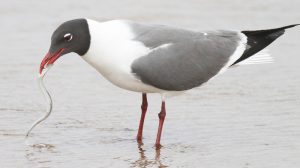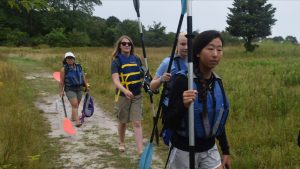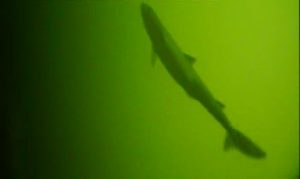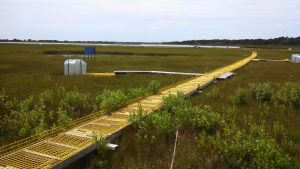Search results for: VIPREG2024 how to get 1xbet promo code Irish
Bulletin: Clam Tents: A New Approach to Soft-Shell Clam Culture and Management
Bulletin: Clam Tents: A New Approach to Soft-Shell Clam Culture and Management Soft-shell clams, Mya arenaria, are an enigma to scientists, managers, and shellfish harvesters in southeastern Massachusetts and throughout the bivalve’s range. One year, clams may settle in very dense concentrations, while, the following year, there may be no soft-shell clam recruitment at the…
Read MorePerformance Requirements in Ocean Mineral Development
Performance Requirements in Ocean Mineral Development Hoagland, P. Marine Policy Reports, Vol. 9, No. 3, pp. 5-10, 1987 WHOI-R-87-001
Read MoreResearch on education: Learning by Listening to Marine Mammal Sounds
Learning by Listening to Marine Mammal Sounds Humpback whale photo courtesy of NOAA. Sept. 2018 — A Sea Grant-funded project aims to make science accessible to visually impaired students. Carla Curran, professor of marine sciences at Savannah State University, and Laela Sayigh, a biologist at Woods Hole Oceanographic Institution, worked with Kathy Patterson, the manager…
Read MoreWHOI-W-05-001 Whitlach, B. International Inv
WHOI-W-05-001 Whitlach, B. International Inv
Read MoreThe Little Fish with a Big Impact
In the Gulf of Maine, there’s a little eel-like fish not much bigger than a large pencil, that buries itself in the sand in the summer and swims up and down in the water column in the spring and fall. It’s called a sand lance and it’s incredibly important to the ecosystem of the Gulf of Maine. If you like whale watching, this little fish is the biggest reason you might or might not see a whale:
Read MoreMy Girls in Science Experience – by Eugena Choi
Last February, when I heard about the Woods Hole Girls in Science program, I was excited. It combined my passion for conservation with marine biology, and I decided – on the spot – that I was going to go. I worked on my application for months before sending it in, and when I got the…
Read MoreTeacher Workshop April 2002
Teacher Workshop April 2002 “Determining the Resistance of Marine Animals to Environmental Chemicals” Dr. Mark Hahn, WHOI, Biology Department Dr. Hahn’s major research interests include receptor-mediated mechanisms of toxicity, and means of adaptation and acquired resistance to exposure to persistent organic pollutants. This presentation centered on looking at toxins in the marine environment, particularly dioxins,…
Read MoreHow Do Sharks Respond to Internal Waves in the Ocean?
A new study provides insight into the behavior of small sharks when encountering a common ocean phenomenon known as internal waves. These waves play powerful and still unknown roles in the exchange of heat, energy, water properties and nutrients throughout the ocean, and can change the vertical distribution …
Read MoreTeacher Workshop November 2003
Teacher Workshop November 2003 “Right Whale Ecology at the Intersection of Science, Technology, and Conservation” Dr. Mark Baumgartner is an Assistant Scientist in the Biology department of Woods Hole Oceanographic Institution. He studies the foraging behavior and ecology of whales, and the formation and location of the patches of plankton that whales feed on. In this…
Read MoreUpcoming Workshop for Educators
The next “Topics in Oceanography” workshop will focus on carbon cycling in coastal Wetlands with Dr. Meagan Eagle Gonneea, USGS, and Dr. Anne Giblin, Marine Biological Laboratory. It will be held October 29, 2019.
Read More



